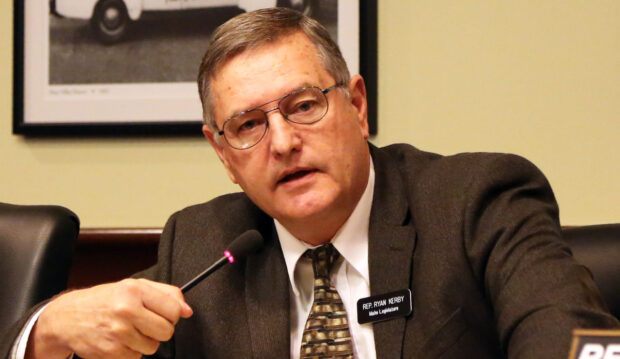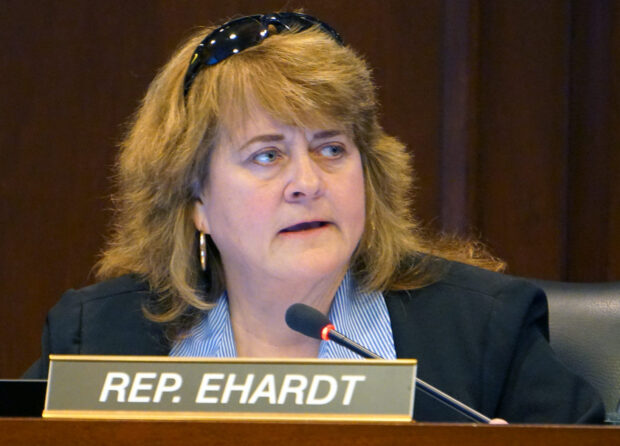Members of the House Education Committee probed the interplay between the State Board of Education and the State Department of Education during a rare ad hoc committee meeting Tuesday at the Statehouse.
As part of an effort to prepare for the upcoming 2020 legislative session, members also took a closer look at how the education budget comes together with state and federal funds.
In the process, legislators may have offered a sneak peek at some of the big debates of the upcoming year.
Vice Chairman Ryan Kerby, R-New Plymouth, brought up Idaho’s consolidated state plan to comply with the federal Every Student Succeeds Act. This month, Idaho EdNews reported Idaho missed all 22 of its interim targets toward longterm education goals in both English and math for the second year in a row.
“Who is in charge of improving education in Idaho?” Kerby asked. “Who should be leading that charge or should we just quit worrying about it now that we are getting the money (from the federal government)?”
Marilyn Whitney, the SDE’s deputy superintendent for communications and policy said SDE and State Board officials worked hard to create goals that were ambitious and designed to reduce the percentage of students and student groups who were not meeting grade level benchmarks. But, she said, state leaders may need to amend those goals to make them more realistic.
“If Superintendent Ybarra were standing here, she would tell you we all are mutually accountable for improving outcomes for our students,” Whitney told Kerby.
Rep. Bill Goesling, R-Moscow, asked about Gov. Brad Little’s K-12 education task force, which is expected to meet Monday to finalize a list of four or five education reform recommendations. He wondered what would happen to the preliminary subcommittee recommendations that don’t end up making the priority list.
“If those four go to the governor, how we can we help you with remaining 16 of those that are not?” he asked.
State Board President Debbie Critchfield said the State Board will take a lead on further developing the task force recommendations that don’t make the priority list and don’t have a budget impact. Until next week, she said it’s too early to tell exactly which recommendations meet that criteria.
“Stay tuned is the answer,” Critchfield told Goesling.
Reps. Dorothy Moon, R-Challis, Goesling and Kerby all asked SDE officials about Idaho’s participation in the Smarter Balanced Assessment Consortium and the administration of assessment tests aligned to Idaho Core Content Standards. All three of them wondered if Idaho had a contract with SBAC and wondered when that would expire or be up for renewal.
Karlynn Laraway, the SDE’s director of assessment and accountability, said Idaho doesn’t have a contract with SBAC, but instead is a member with a seat at the SBAC’s executive committee. If Idaho wanted to scrap its current test and redesign and implement a new test, the process could take five to seven years, Laraway said.
Chairman Lance Clow, R-Twin Falls, got approval from House Speaker Scott Bedke, R-Oakley, to hold the committee meeting Tuesday and Wednesday to help share information with his committee members, nearly half of whom are first-term lawmakers attempting to make sense of the state’s largest budget and a complicated suite of laws and rules governing Idaho’s public education system. Because the Legislature is not in session, the conditions of the meeting were that lawmakers could not introduce bills or deliberate toward a policy decision, Clow said.

Rep. Barbara Ehardt, R-Idaho Falls, had pushed throughout the 2019 session for a simple flow chart to illustrate how money and state agencies came together to support education. She said Tuesday’s meeting was beneficial for the committee. She appreciated SDE officials providing a leadership organizational chart and so many of the SDE department directors attending in person so she could connect names, faces and program responsibilities.
“Yeah it’s been helpful, “Ehardt said. “There have already been some things that are useful in allowing us that opportunity to clarify a few things. It’s difficult during the session when they are presenting to us that which they want us to know, which is not necessarily really where our questions are.”
Forty-two people, many of them SDE and State Board officials, attended Tuesday’s meeting, making it one of the best-attended House Education meetings of the year. All 15 members of House Education attended at least a part of Tuesday’s meeting.
Wednesday update
The committee reconvened Wednesday and spent almost seven hours asking about testing, budgets, literacy plans and the state’s return on investment for education funding.
Much of Wednesday morning was devoted to demonstrations of the Idaho Reading Indicator (IRI) assessment and an overview of the Idaho Standards Achievement Test (ISAT).
Then, a panel of school superintendents comprising Caldwell’s Shalene French, Nampa’s Paula Kellerer, Kuna’s Wendy Johnson and Lewiston’s Robert Donaldson described how their districts are using their share of the state’s $26 million literacy initiative.
The discussion was all over the place, covering even more ground than Tuesday. But Rep. Jerald Raymond, R-Menan, came the closest to synthesizing how many of the Republicans approached this week’s meetings. Raymond said it appears to him that all of the different ingredients that combine to make up a good education have now been thrown into a pressure cooker, which he said he regrets.
“There are pages and pages of statutes related to education,” Raymond said. “Our administrators, bless their hearts, have so much pressure on them from teacher negotiations to teacher evaluations to why in the world didn’t the team make the playoffs. There is pressure on our children… My question is, as we move forward, how do we simplify this? Not can we, because we can. How do we simplify this process from top to bottom?”
Rep. Steve Berch, D-Boise, said this week’s meetings were a great start to getting geared up for the upcoming session. Going forward, Berch said he would like to see the conversations expand and evolve to focus on a vision and strategy for the future, not just holding costs in line for the taxpayer.
“You have to strike a balance between being smart with the taxpayers’ dollars every day and making smart investments for the future,” Berch said. “Otherwise you know the cost of everything and the value of nothing. We’re in an unprecedented situation our state has never larger and never been growing at a faster rate. We need to be thinking out into the future.”
